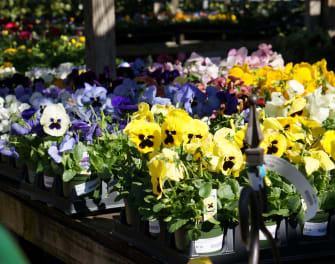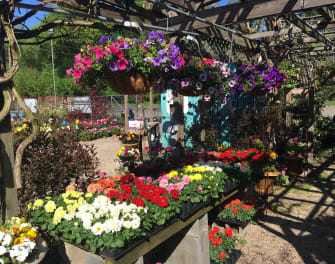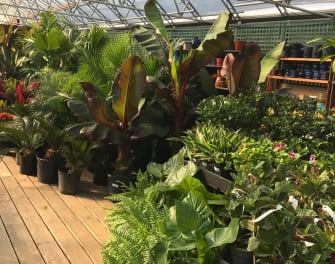The perfect garden will be a feast for the eyes and will fill you with joy every time you step outdoors. To accomplish this mission, you must blend a variety of plants to create complementary color palettes and a range of textures to add depth and interest at every turn. As you create your garden, not only will you want to have different types of trees, shrubs, and perennials, but also you will want to add in annual plants for color and tropical plants for lushness and variety.

What Are Annual & Tropical Plants?
Annual and tropical plants may not be the backbone of your garden, but they are ideal for filling in spaces and adding variety. You should consider planting several annual varieties to ensure that you have plenty of color from the start of the growing season to the end.
Annuals
Annuals are plants that only grow for one season. They do not come back to life the next spring to make new flowers. Instead, they must be replanted every year. Annuals are further classified by how well they handle cold temperatures. Those that are able to withstand cold soil and freezing temperatures best, and that may even be able to continue growing after the first light frost of the season, are classified as hardy annuals. Those that cannot handle any frosts but that can withstand colder temperatures and colder soil are known as half-hardy annuals. Finally, tender annuals need warm soils and warm temperatures to survive and thrive.
Tropicals
Tropicals are those large-leafed plants that grow naturally in tropical areas of the world. They require warm temperatures and plenty of regular rain. Although not all tropical plants will thrive in outdoor gardens in New York, Decker’s Nursery offers numerous options that can thrive outdoors in the summer and winter well indoors. You may also choose to plant tropicals outside as annuals.
Gardening with Annuals & Tropical Plants
Gardening with both annuals and tropical plants requires a knowledge of the best plants for your zone and of those well-suited to your gardening style whether you are hands-on or hands-off.
Annual Plants & Flowers
Annuals are generally easy to grow as long as you pick ones for your growing zone. Greenlawn, NY, is in USDA Hardiness Zone 7a, which gives you a wide variety of annual options that will look great around your yard and in your garden. When planting annuals here, you can choose either to start them from seed or to plant them as small pre-grown plants purchased in flats from our nursery. However, if you grow them from seeds, you will want to begin them indoors so that you have a long enough growing season. Some options include zinnias, morning glories, lupine, basil, and impatiens.
Be sure that the soil is well-drained and has a pH between 6.3 and 6.7. You may also want to start by digging compost into the site. Compost will help your plants get the nutrition they need so that they can bloom throughout the entire growing season. As you care for your plants, be sure to deadhead frequently by pinching off old flowers. In addition, fertilize them with a slow-release formula as soon as you plant them, or use a water-soluble fertilizer every two to three weeks.

Tropical Plants & Flowers
Tropical plants and flowers may seem as if they would be impossible to grow in New York, but certain varieties can thrive here. Other less hardy varieties can be put outside in pots during the summer and brought indoors during the winter. Tropicals are excellent for filling in spots in your garden with lush, glossy foliage and vibrant blooms. Some good examples include the elephant’s ear, jasmine, angel’s trumpet, and hibiscus.
These plants do best in the heat and require plenty of sun to flourish. In addition, they need adequate water throughout the growing season. You should also provide a regular application of fertilizer to boost colorful blooms and fuller foliage. When cold weather hits, you can choose to dig up the roots of your in-ground plants and let them winter indoors or can choose to view your tropicals as annual plants instead.

Frequently Asked Questions
Tropical & Annual Plant FAQs
You may think of annual plants as being simple choices for your yard and garden because they are so easy to grow. However, each annual and tropical plant has its own unique characteristics and needs that you must keep in mind to improve its growth, blooms, and color throughout the growing season. Read on to get answers for your most-asked questions and to discover where you can find even more customized help for your concerns.
What’s the difference between annual flowers and perennial flowers?
The main difference between annuals and perennials is the length of their lives. Whereas annuals are planted in the spring or summer and grow until the start of cold weather, perennials appear to die in the fall and winter but come back to life for the next growing season. Most live for at least five years, but some particularly hardy varieties can live up to 20 years.
How often should you water and fertilize annuals?
Annuals require plenty of water throughout the growing season and may need to be watered every day if they are in direct sunlight and if there has been no rain. Rather than quickly watering the top of the soil only, opt for a slower watering that allows the water to seep several inches into the soil. While the exact weekly water needs vary among different annuals, you should aim for approximately one inch of water per week in general.
All annuals also require fertilizer for the best growth and stunning blooms. If you are using fresh potting soil, the soil most likely already has slow-release fertilizer mixed into it. On the other hand, you could opt to add a water-soluble fertilizer to your watering can every week or two to provide plenty of nutrition.
What annual plants are deer-resistant?
The areas around Greenlawn can see plenty of deer at certain times of the year, and these animals are typically looking for tender vegetation that they can use as food. To avoid watching your annuals become deer fodder, opt for deer-resistant varieties, especially if your backyard or your garden is not surrounded by a sturdy, tall fence.
Some of the best deer-resistant annuals that grow well in the sun include the following:
Flowering tobacco
- Salvia
- Snapdragon
- Canna lily
- Globe amaranth
- Sweet alyssum
- Black-Eyed Susan
- Zinnia
- Marigold
Deer-resistant annuals that will thrive in shady locations include the following:
- Caladium
- Begonia
- Wishbone flower
- Persian shield
- Monarda
What annual flowers attract hummingbirds?
Everyone loves seeing gorgeous, colorful birds visiting their backyard gardens, and a fan favorite is the beautiful hummingbird. These birds may be tiny, but they are incredible for boosting the mood and even for pollinating small flowers that other birds cannot access. If you want to attract these amazing creatures, there is no need to hang out a bird feeder when you can instead rely on these gorgeous flowering annuals.
- Petunia
- Bleeding heart
- Zinnia
- Bee balm
- Salvia
- Butterfly bush
- Lupine
- Cardinal flower
What annual plants like shade?
A shady garden can be a great place to relax even in the heat of summer. Although it may seem as if a majority of annuals grow best in the sun, you do not have to forego all color and foliage just because your yard only gets four or fewer hours of sunlight every day. If your yard is in partial shade, meaning it gets only three to four hours of sun each day, or even if you have some spots that do not get any direct sunlight, opt for a variety of these bright beauties.
- Begonia
- New Guinea impatiens
- Oxalis
- Browallia
- Polka dot plant
- Lobelia
- Fuchsia
- Alyssum
- Larkspur
- Viola
- Pansy
- Snapdragon
What annuals like full sun?
If you have very sunny spots in your yard, you have even more great options for annuals that will burst into bloom throughout the season or fill your garden with lush leafiness. Plus, many of these annuals will also hold up well under strong heat without wilting by late afternoon.
- Marigold
- Cosmos flower
- Spider flower
- Amaranth
- Cypress vine
- Zinnia
- Petunia
- Penta
- Vinca
- Nemesia
- Sunflower
- Celosia
- Cleome
How should I save my annual plants for next year?
One of the hardest parts about choosing annuals for your garden is realizing that the money you spent in the spring is lost forever once your plants die in the fall. However, you may be surprised to learn that a little extra foresight and a bit of work can turn these plants into workhorses that will bless your garden with color once again next year. There are two main ways that you can save your annuals over the winter.
Your first option is to take cuttings from your plants late in the summer, place them in soil or water and let them grow new roots in preparation for next spring. The best plants for this propagation technique are bushier annuals that like the shade. For example, begonias and impatiens work well with this method. It is vital to make cuttings that have at least one bumpy node on the stem that can be placed beneath the surface of the soil or water.
The other option that allows annuals magically to return next spring is wintering your plants indoors. You can either bring potted plants indoors or can dig up plants from the ground and place them in indoor pots in the fall. Once again, this does not work well for all plants but is best-suited for tender perennials that are usually used as annuals in northern climates. At Decker’s, we can help you choose the best plant options for this wintering method, such as geraniums and heliotrope.
What are the best cold-hardy tropical plants?
Some of the most beautiful garden plants are tropicals that boast large, glossy leaves and bright blooms. However, because tropicals are ideally suited for warm and humid jungles, you may not think that it is possible to grow any tropicals outdoors in New York. However, you might be surprised at the wide range of outdoor-friendly tropicals we sell at Decker’s as well as at the variety of cold-hardy tropicals we offer. Whether you prefer to grow them in containers or keep them in the ground, these varieties typically work well for USDA Zone 7, which is where Greenlawn is located.
- Colocasia
- Hibiscus
- Needle palm
- Sago palm
- Canna
- Hardy banana
- Hostas
- Yucca
- Japanese silver grass
What tropical plants like full sun?
Many tropical plants love the heat and humidity, and a number of them do well in sunny locations. If you are planting on the south side of your yard or are looking for some long-lasting blooms, look no further than these popular varieties.
- Blood flower
- Canna
- Taro
- Sweet potato vine
- Japanese banana
- Scarlet sage
- Chinese hibiscus
How can I protect my tropical plants through winter?
If you have chosen beautiful tropical plants that are not winter-hardy here in the Greenlawn area, you can still save them over the winter with a few simple steps. The easiest option is to plant your tropicals in pots so that you can simply bring them indoors once cold weather arrives. However, you must be sure that they get the daily sunlight that they need to thrive.
If you are dealing with cold-hardy tropicals that can safely go dormant in the ground, you will want to cover them with a thick layer of mulch for insulation. You may also want to use protective barriers, such as wind fencing, to keep snow and ice off them.
If you instead have tropical plants that grow from bulbs, such as elephant ears, you can wait for the leaves of the plants to be damaged by the frost before digging up the bulbs and allowing them to dry out in a sheltered place. Once dry, you can store the bulbs in a cool, dark place, making sure that they do not rot or shrivel from water deprivation.
Which annual & tropical plants attract butterflies?
Colorful, flowery annuals and tropicals are known for attracting bees and birds to their bright blooms, but some are especially good at attracting flitting butterflies. If you are longing to start a butterfly garden in your backyard, opt for some of the following plants that provide excellent places for butterflies to lay their eggs and find food to eat.
- Milkweed
- Violets
- Asters
- Butterfly bush
- Skyflower
- Orange jasmine
- Cardinal’s crest
- Salvia
- Blood flower
- Black-Eyed Susan
Where can I buy annual and tropical plants on Long Island?
When you are buying annuals and tropicals for your garden, you want to choose varieties that you can rely on to grow disease-free all season long. When you visit Decker’s Nursery in Greenlawn, NY, you are choosing a full-service garden center that has years of experience, one of the widest ranges of plants and gardening items in the area and some of the most experienced and knowledgable gardeners you will ever meet. Come in today to discover your newest favorite plant, get seasonal help for your flowers, or stock up on gardening supplies.
